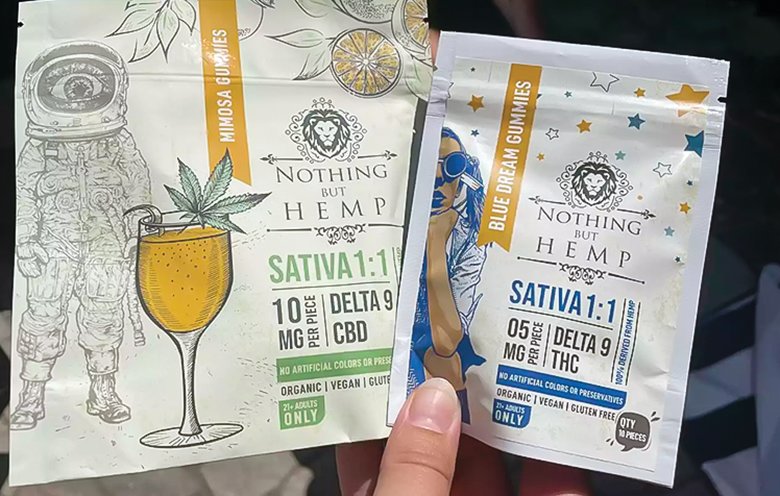Support the Timberjay by making a donation.
THC edibles and beverages now legal in state
New law, passed this session, appears to have caught many GOP legislators unaware
REGIONAL- You can’t smoke it, but you don’t need to in order to get a marijuana-like buzz from edibles and beverages laced with hemp-derived Delta-9 THC, which became legal to sell in …
This item is available in full to subscribers.
Attention subscribers
To continue reading, you will need to either log in to your subscriber account, or purchase a new subscription.
If you are a current print subscriber, you can set up a free website account and connect your subscription to it by clicking here.
If you are a digital subscriber with an active, online-only subscription then you already have an account here. Just reset your password if you've not yet logged in to your account on this new site.
Otherwise, click here to view your options for subscribing.
Please log in to continue |
THC edibles and beverages now legal in state
New law, passed this session, appears to have caught many GOP legislators unaware
REGIONAL- You can’t smoke it, but you don’t need to in order to get a marijuana-like buzz from edibles and beverages laced with hemp-derived Delta-9 THC, which became legal to sell in Minnesota last Friday.
The new law allowing edibles to contain the same psychoactive compound as marijuana sailed under the radar as part of a larger health and human services bill passed by the Minnesota Legislature at the end of the 2022 session. The proposal, intended ostensibly to standardize state regulations regarding THC in edibles, apparently caught some Republicans who voted for the measure by surprise, as House DFL members who crafted the measure stayed mum about it.
“It was done publicly. We just didn’t promote it because sometimes having more public attention amps up the level of political pressure that certain people in the other party may feel,” said House Majority Leader Ryan Winkler during a Tuesday press conference. “Just because we did it in the public eye doesn’t mean that everybody was paying attention or tracking it.”
That apparently included Republican Senators Michelle Benson, of Ham Lake, and Jim Abeler, of Anoka, who both helped craft the overall health and human services bill in the Senate. Abeler said last week that he didn’t realize the law would legalize THC edibles, while Benson initially denied the change.
“Do you think we make gummies legal? Obviously, someone isn’t reading the law,” Benson was quoted as saying.
But edibles, including gummies that have previously contained only the non-psychotropic cannabis element CBD, are indeed now legal in Minnesota. And the regulations regarding THC address a public health concern with Delta-8 THC products, a federally legal product containing a less potent version of THC that has been widely available in the state, according to Rep. Heather Edison, DFL-Edina, who authored the specific section of the bill.
“There were these products that essentially didn’t really have regulations on them. But people were consuming them,” Edelson said. “They were being sold all over the state of Minnesota, and a lot of them in gas stations.”
Edelson says the use of unregulated products by minors caused an increase in poison control calls. She believes those numbers will be reduced now that Delta-8 THC products will be regulated under the measure.
Steven Brown, co-founder of the Minnesota Cannabis Association and CEO of Nothing But Hemp, said over the last year those in the hemp industry were seeing products with varying amounts of THC pop up in smoke shops and CBD stores throughout the state.
He said the new law provides important consumer protections that he believes reflect the state’s conservative stance on hemp-derived THC products.
THC regulations
While marijuana-derived THC is still illegal for general purchase, hemp-based THC is chemically the same but produced in much smaller amounts in the growing process. While it takes more hemp to produce an equal amount of THC, the end product is exactly the same.
The new law says that food and beverages cannot contain more than five milligrams of hemp-based THC per serving and no more that 50 milligrams per package.
Packaging also must not mimic any non-THC products and be designed to prevent marketing to children. Individuals must be 21 years old to purchase THC edibles and beverages.
Five milligrams is more restrictive than many other states where ten milligrams per serving is allowed, but five-milligram products are readily available and more such items are anticipated to be produced in-state.
Enforcing the new law falls to the state’s Pharmacy Board, an agency poorly equipped at present to handle the task. The board has only 23 employees to deal with all pharmaceuticals, and the fact that THC products can be sold anywhere complicates things further. Pharmacy Board Executive Director Jill Phillips said the board will initially rely on consumer complaints to monitor products, but they have no control over licensing manufacturing or retailing. The Pharmacy Board has also called for the Legislature to consider an Office of Cannabis Management, as the Department of Agriculture and Department of Health also have authority for hemp production and products and medical marijuana, respectively.
Minnesota Public Radio contributed to this report. You can hear MPR news at 89.3 FM in Ely and at 92.5 FM on the Iron Range.






